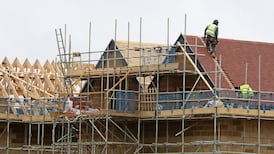Elon Musk acknowledged on Monday that his agreed $44 billion (€42 billion) purchase of Twitter might fall through and that a lower price was "not out of the question", adding to Wall Street fears that he is reconsidering his offer for the company.
The comments at the All-In Summit in Miami came three days after Mr Musk declared on Twitter that he was putting the deal “on hold” over concerns there were more fake accounts on the platform than the “less than 5 per cent” that the social media company claims.
Proof
On Tuesday morning, Mr Musk hit out again at Twitter chief executive Parag Agrawal for refusing to provide proof over the number of fake accounts. He tweeted that the "deal cannot move forward until he does".
Mr Musk’s comments have fuelled speculation on Wall Street that the Tesla and SpaceX chief executive is seeking to renegotiate the deal or walk away entirely, though he has said he is still committed to the transaction.
Asked on Monday if his Twitter purchase will go through, Mr Musk said: “It really depends on a lot of factors here. I’m still waiting for some sort of logical explanation for the number of sort of fake or spam accounts on Twitter. And Twitter is refusing to tell us. This seems like a strange thing.”
He said he believed at least 20 per cent of the accounts on the network were fake, and that the proportion could be as high as 90 per cent.
Mr Musk faces a $1 billion break-up fee if he walks away, though Twitter can also sue him to force him to go through with the deal unless he can point to any significant information that was not disclosed at the time of the agreement.
Warning
Mr Musk said it may be “a material adverse misstatement” if the number of bots is well above the 5 per cent that Twitter has disclosed. “Like if you said, OK, I’m going to agree to buy your house. You say the house has less than 5 per cent termites. That’s an acceptable number. But if it turns out it the right per cent is 90 per cent termites, that’s not OK.”
Mr Musk latched on to the issue of fake accounts after a regulatory filing earlier this month in which Twitter repeated a standard warning that its estimate “may not accurately represent the actual number” of fake accounts, and the true total “could be higher”.
The timing of his intervention over a longstanding matter raised worries on Wall Street that he would use the issue as an excuse to reopen negotiations.
Twitter’s shares fell nearly 8 per cent on Monday, leaving them 30 per cent below the $54.20 a share that Mr Musk has agreed to pay for the company. Most of the decline came before the reports of the billionaire’s comments about potentially paying a lower price.
Earlier on Monday, Mr Musk challenged Mr Agrawal on the platform after the Twitter chief executive published a lengthy thread outlining the methodology behind its estimate that spam makes up less than 5 per cent of its user base, arguing that the figure could not be accurately ascertained by third parties without access to data such as IP addresses, geolocation and phone numbers.
Mr Agrawal wrote: “We don’t believe that this specific estimation can be performed externally, given the critical need to use both public and private information (which we can’t share).”
Confidence
He added that the “error margins on our estimates give us confidence in our public statements each quarter”.
“We shared an overview of the estimation process with Elon a week ago and look forward to continuing the conversation with him, and all of you,” mr Agrawal wrote on Twitter.
Mr Musk replied with an emoji of a pile of faeces. In a second tweet, he wrote: “So how do advertisers know what they’re getting for their money? This is fundamental to the financial health of Twitter.”
Mr Musk also said at the Miami event that he was open to the idea of Twitter transforming into something akin to the west’s WeChat, the all-encompassing “superapp” in China that allows users to shop, text and post to social media all within one app.
“Such an app would be really useful (in the west),” Musk said, adding that he was not sure whether Twitter should become this superapp, or whether it should be built from scratch. But he was certain about one thing: “This thing needs to exist.” – Copyright The Financial Times Limited 2022










